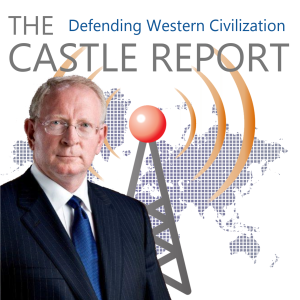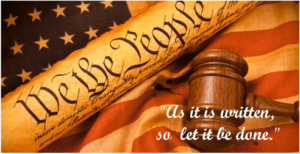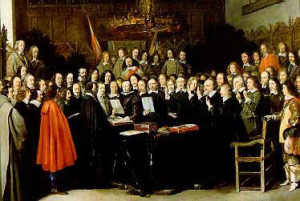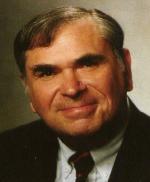
Original Intent
 Today we are going to discuss the original intent of the United States Constitution. This is relevant for our discussion because I am the Constitution Party’s candidate for President of the United States and the Constitution Party was formed originally by a group of people who believed that the original intent of the United States Constitution is still relevant today and can be defended intellectually to the nation.
Today we are going to discuss the original intent of the United States Constitution. This is relevant for our discussion because I am the Constitution Party’s candidate for President of the United States and the Constitution Party was formed originally by a group of people who believed that the original intent of the United States Constitution is still relevant today and can be defended intellectually to the nation.
How could the founders imagine, let alone prepare for the possibility that the United States might abandon the correct method of constitutional interpretation (i.e. original intent) and with it abandon the rule of law in general. Today not only has original intent been abandoned but it is not understood by the average American who looks on the mention of it as extremely right wing or at best simplistic.
No judges employ it, and no lawyers argue it. It is not desired by any politicians or by their special interest groups for whom the Constitution’s quaint words and phrases serve only as a cover story for what best lines their pockets.
Today rather than the Constitution being judged by a standard of original intent it is judged by a standard of my intent, i.e. the political, economic, or cultural purposes of the person construing it. This all brings to mind the question of whether or not the country the founders created even exists anymore. The rule of law is completely ignored and government claims the power to put into effect whatever laws it likes—in Congress through statutes, in the judiciary through precedents, or the President through executive orders. Even foreign nations exert power over us through treaties and through the United Nations.
We the people whose servants these officials supposedly are—retain only the right to participate in the process, having elected these officials because of their lies, thereafter suffer the duty to obey whatever they command. Officials through the constitution control we the people instead of we the people through the Constitution controlling the officials. That is the very opposite of original intent.
A good example of all this is Article 3 Section 1 which established the judiciary of the United States as the third branch of government. Article 6 states that three things are the supreme law of the land: “This Constitution…the laws of the United States…made in pursuance thereof; and all treaties… made under the authority of the United States.”
Conspicuously absent from that list is a court opinion. In recent years, especially since Roe v. Wade was decided in 1973, it has been generally assumed in America that a Supreme Court opinion is the supreme law of the land. Therefore, short of a Constitutional amendment or court reversal, federal. State, and local officials—executive, legislative, and judicial—must conform their actions to the rules handed down by the courts.
At the time the Constitution was written, it was universally understood that court opinions were not laws; therefore, it cannot be logically argued that federal court opinions are the laws of the United States within the meaning of Article 6. Nor can it be logically argued that even an opinion of the Supreme Court, determines what the Constitution means. Once again, under the doctrine of original intent, at the time the Constitution was written a court opinion interpreting a provision of the Constitution was not the equivalent of that provision.
Thus the Constitution is not what the Supreme Court says it is. Rather, the Constitution is what the Constitution says it is. When Article 6 says that all federal, state and local officials executive, legislative and judicial “shall be bound by oath or affirmation to support this Constitution,” it means those officials are bound by oath to support the Constitution as it is written, not as they wish it were written, or as it has been construed by the Supreme Court.
The founders talked a lot about the necessity of public virtue as a precondition for freedom. Unfortunately they provided no formula for ensuring that across generations Americans would have a continuity of civic and personal virtue sufficient to protect the Constitution and guarantee proper usage. So in America today vice has supplanted virtue and it has seized permanent power.
Today’s virtueless leaders rather than relying on the original intent of the Constitution rely on a strategy of divide and conquer, by deceiving society into destroying its own cohesion, thereby fragmenting into hostile factions, generating into chaos and ultimately surrendering all power to a self-selected group of elite intellectuals who falsely promise to establish social peace. Rule from above through dissension below. This factionalism is simply personal vice translated into political action.
Finally folks: You have a chance this election cycle to choose a new path for America. “Jeremiah 6:16 “Seek ye out the old paths and walk therein.”
At least that’s the way I see it,



2 Comments
Gale Joy
That’s the way I see it also.
You are not alone in this fight to restore the original intent of the founders and framers.
Keep it up!!!
Bob Bowen
An interesting book on this subject is “The Original Constitution, What It Actually Said And Meant” by Robert G. Natelson (2010). In the Preface on page 11, I quote: “Most of the leading Founders were lawyers and the general public was far more knowledgeable about law than it is today. The Constitution was, of course, a legal document written in a particular legal environment. So you need to know something of 1787 law to fully understand the meaning of a legal document written in 1787.”
The elementary school I attended in the early 1950s required the students to pass a very stringent test on the Constitution before being promoted to the 8th grade. We spent several weeks pouring over the Constitution in order to pass that test. My children in the late 1970s through the 1980s were shown very little interest in the Constitution in their public schools. Isn’t it time to push the reset button and teach our future generations about the true intent of the Constitution ? Or is it too late ? On a recent visit with my oldest son (now age 51), I can see that he is now learning what he missed in the public schools of his youth. So, it is not too late.